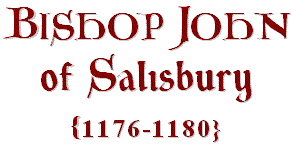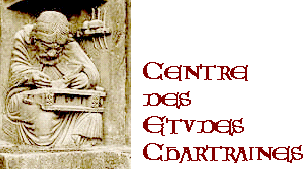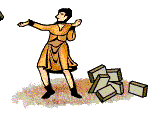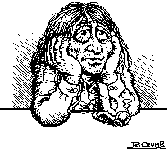|
WORKS :
Entheticus, (1155-57), ed. Ronald E. Pepin, in: Traditio
31, 1975, 127-193.
Metalogicon, (1159), ed. Clement C.J. Webb, 1929; english trans.
by Daniel D. McGarry, The Metalogicon
of John of Salisbury. A twelfth-century defense of the verbal and
logical arts of the trivium, 1955, reprinted
1962.
Policraticus sive de nugis curialium, (1156-59), ed. Clement
C.J. Webb, 2 vols., 1909; english translation:
books 4-6 and parts of 7-8 by John Dickinson, 1927; book 1-3 and parts
of 7-8 by Joseph B. Pike, 1938; Murray F. Markland, J. Policraticus.
The Statesman's Book, 1979.
Vita beati Anselmi, (1163), PL 199, cc. 1009-1040.
Historia Pontificalis, (1163/64), ed. Marjorie Chibnall, John
of Salisbury's Memoirs of the Papal Court,
1965, Nachdruck 1986.
Vita beati Thome, (1171-73), ed. James C. Robertson & John
B. Sheppard, Materials for the History
of Archbishop Thomas Becket, II, (Rerum Britannicarum medii
aevi scriptores, vol. 67), 1876, 301-322.
The Letters of John of Salisbury, I: The Early Letters,
1153-61, ed. W.J. Millor, H.L. Butler
& Christopher N.L. Brooke, 1955, reprinted 1979; II: The Later
Letters,
1163-80, ed. W.J. Millor & Christopher
N.L. Brooke, 1979.
Collected Works: Opera Omnia, ed. John A. Giles, 5 vols., 1848
(reprinted 1969), also in: PL 199 (1855),
cc. 1-1040.
|
|
BIBLIOGRAPHY :
Hans Hohenleutner, "J. in der Literatur der letzten zehn
Jahre," Historische Jahrbuch 77,
1958, pp. 493-500.
David Luscombe, "A Bibliography 1953-1982," in: The World
of John of Salisbury, ed. Michael Wilks,
1984, pp. 445-457.
______________, "John of Salisbury in Recent Literature,"
in: The World of John of Salisbury,
ed. Michael Wilks, 1984, pp. 21-38.
Carl M.W. Schaarschmidt, Johannes Saresberiensis, 1862.
Clement C.J. Webb, John of Salisbury, 1932.
R.L. Poole, "The Masters of the School of Paris and Chartres
in John of Salisbury's Time," in:
Poole, ed., Studies in Chronology and History, Oxford 1934,
228ff.
Hans Liebschütz, "John of Salisbury and Pseudo-Plutarch,"
Journal of the Warburg and Courtland Institutes
VI, 1943, 33-39.
______________, Mediaeval Humanism in the Life and Writings of
John of Salisbury, Studies of the Warburg
Institute XVII, 1950.
______________, "Englische und europäische Elemente in der Erfahrungswelt
des Johannes von Salisbury," Die Welt als Geschichte XI,
1951, 38-45.
______________, "Chartres und Bologna. Naturbegriff und Staatsauffassung
bei Johannes von Salisbury," Arbeiten
zur Kirchengeschichte, L, 1968, 3-32.
Johan Huizinga, "Ein praegothischer Geist: Johannes von Salisbury,"
in: Huizinga, ed., Parerga, 1945.
R.W. and A.J. Carlyle, A History of Medieval Humanism in the Life
and Writings of John of Salisbury, 1950.
Barbara Helbling-Gloor, Natur und Aberglaube im Policraticus des
Johannes von Salisbury (Dissertation,
University of Zürich), 1956.
M.A. Brown, "John of Salisbury," Franciscan Studies,
XIX, 1959, 241-297.
G. Misch, "Johannes von Salisbury und das Problem des mittelalterlichen
Humanismus," in: Geschichte der Autobiographie,
III, 2.2, 1962, 1157-1295.
Richard H. Rouse and Mary A. Rouse, "John of Salisbury and the
Doctrine of Tyrannicide," Speculum,
XLII, 1967, 693-709.
E.K. Tolan, "John of Salisbury and the Problem of Medieval
Humanism," Etudes d'histoire littéraire
et doctrinale, 1968.
Janet Martin, John of Salisbury and the Classics (Diss. Cambridge,
Mass), 1968.
___________, "John of Salisbury's Manuscripts of Frontinus and
of Gellius," Journal of the Warburg
and Courtland Institutes, XL, 1977, 1-26.
___________, "Uses of Tradition. Gellius, Pretonius and John
of Salisbury," Viator, X, 1979,
57-76.
Brian P. Hendley, "John of Salisbury's Defense of the Trivium,"
in: Arts libéraux et philosophie au moyen
age, 1969.
______________, "John of Salisbury and the Problem of Universals,"
Journal of the History of Philosophy, VIII,
1970, 289-302.
Georg Miczka, Das Bild der Kirche bei Johannes von Salisbury,
1970.
Beryl Smalley, The Becket Controversy and the Schools. A Study
of Intellectuals in Politics, 1973, 87-108.
Ursula Odoj, Wissenschaft und Politik bei Johannes von Salisbury,
1974.
Roman W. Brüschweiler, Das sechste Buch 'Policratus' von Johannes
von Salisbury, 1975.
Amnon Linder, "The Knowledge of John of Salisbury in the Late
Middle Ages," Studi medievali, XVIII,
1977, 315-355.
Max Kerner, Johannes von Salisbury und die logische Struktur seines
Policraticus, 1977.
___________,"Randbemerkungen zur Institutio Traiani," in:
The World of John of Salisbury, ed.
Michael Wilks, 1984, 203-206.
___________, "Die Institutio Traiani - spätantike Lehrschrift
oder hochmittelalterliche Fiktion?,"
Fälschungen im Mittelalter, I, 1988, 715-738.
Klaus Guth, Johannes von Salisbury (1115/20-1180), 1978.
_________, "Standesethos als Ausdruck hochmittelalterlicher Lebensform,"
Freiburger Zeitschrift für Theologie und
Philosophie, XXVIII, 1981, 111-132.
W. Ullmann, "John of Salisbury's Policraticus in the later Middle
Ages," in: Festschrift H. Löwe, 1978,
519-545.
Tilman Struve, Die Entwicklung der organologischen Staatsauffassung
im Mittelalter, 1978, 123ff.
____________, "Vita civilis naturam imitetur ... Der Gedanke
der Nachahmung der Natur als Grundlage der
organologischen Staatskonzeption Johannes von Salisbury," Historisches
Jahrbuch der Görres-Gesellschaft, CI, 1981, 341-361.
J. Flori, La chevalerie selon J. nature, fonction, idéologie, in Revue
d'histoire ecclésiastique, LXXVII, 1982,
35-77.
Cary Nederman, "Aristotelianism in John of Salisbury's Policraticus,
Journal of the History of Philosophy, XXI,
1983, 203-229.
_____________, "The Physiological Significance of the Organic
Metaphor in J.'s Policraticus, History of Political Thought,
VIII, 1987, 211-223.
_____________, "Aristotelian Ethics and John of Salisbury's Letters,"
Viator, XVIII, 1987, 161-173.
_____________, "A duty to kill ...," The Review of Politics,
L, 1988, 365-389.
Anne J. Duggan, "John of Salisbury and Thomas Becket. The World
of John of Salisbury and Thomas Becket,"
in: The World of John of Salisbury, ed. Michael Wilks, 1984,
427-438.
Jan van Laarhoven, "Thou shalt not slay a tyrant! The so-called
theory of John of Salisbury," in: The
World of John of Salisbury, ed. Michael Wilks, 1984, 319-341.
Joseph Möller, "Johannes von Salisbury," in: Exempla
historica. Epochen der Weltgeschichte in Biographien:
Mittelalter, XV, 1984, 67-85.
K.S.B. Keats-Rohan, "The Chronology of John of Salisbury's Studies
in France," Studi medievali, XXVIII,
1987, 193-203.
Robert Blake, John of Salisbury. The man and his policies,
1987.
F. Überweg, Grundriß der Geschichte der Philosophie, II,
242-245.
Enciclopedia Filosofica, Venice/Rome 1957/58, II, 766-769.
Realencyclopädie für protestantische Theologie und Kirche,
ed. A. Hauck, 3rd. ed., Leipzig 1896-1913,
IX, pp. 314-319.
Die Religion in Geschichte und Gegenwart. Handwörterbuch
für Theologie und Religionswissenschaft. (ed.
Kurt Galling, Tübingen 1957-1962), III, 820.
Lexikon für Theologie und Kirche, 2nd ed., V, 1079-1080;
Lexikon des Mittelalters (München 1980-1999), V, 599-601.
Theologische Realenzyklopädie (Berlin, New York 1976 ff.),
XVII, 153-155.
Dictionary of the Middle Ages, VII, 139-140.
The Encyclopedia of Philosophy, IV, 284-286.
Udo Krolzik in Biographisch-Bibliographischen Kirchenlexikons,
III (1992), cc. 549-552. (http://www.bautz.de/bbkl/j/Johannes_v_sali.shtml
)
|




